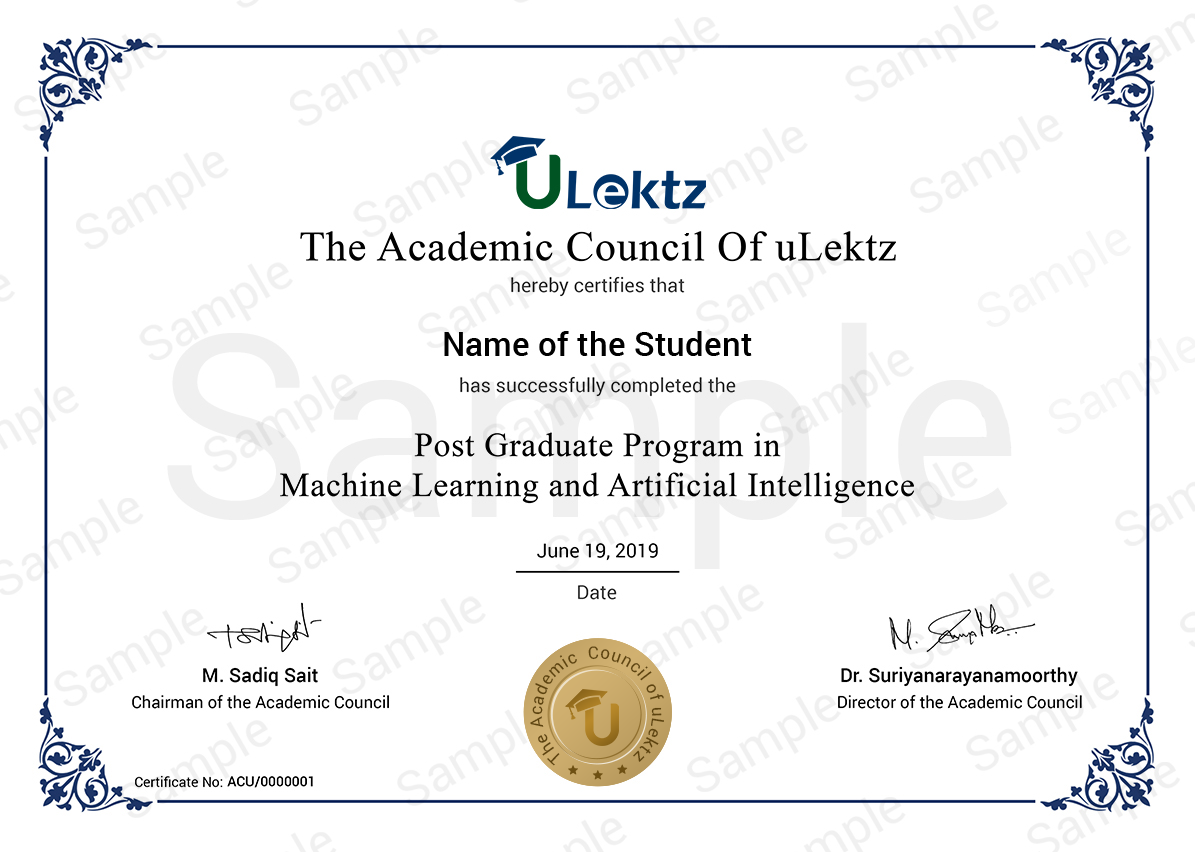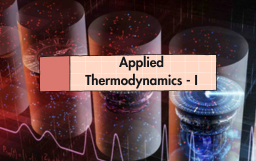

Note: Please check your Spam or Junk folder, in case you didn't receive the email with verification code.
Non-Linear: Random Order
The course "Applied Thermodynamics" offers a comprehensive study of the principles and applications of thermodynamics in various engineering systems, with a focus on energy conversion, heat transfer, and fluid dynamics. This course equips students with the knowledge and tools to analyze, design, and optimize energy-related processes and systems commonly found in mechanical, chemical, and other engineering disciplines.
Course Objectives:
• Provide a deep understanding of the fundamental laws and concepts of thermodynamics.
• Develop the ability to apply thermodynamic principles to real-world engineering problems.
• Explore the applications of thermodynamics in engines, compressors, and other energy systems.
• Investigate the effects of various factors on system performance and efficiency.
• Analyze heat transfer mechanisms and their significance in engineering systems.
• Examine the behavior of gases and fluids under different conditions.
• Introduce students to combustion processes, including abnormal combustion and knocking.
• Familiarize students with the properties and behavior of fuels.
• Cover measurement techniques and analysis methods used in engine performance evaluation.
• Provide insights into modern technologies such as fuel injection systems, intercoolers, and dynamometers.
• Cultivate critical thinking and problem-solving skills through hands-on applications.
Benefits
• The course in Applied Thermodynamics offers a solid foundation in thermodynamics, essential for understanding energy processes in engineering.
• Students develop problem-solving skills, analyze complex thermodynamic issues, and enhance decision-making.
• This course enhance efficiency and think critically of students.
• Exposure to advanced technologies ensures familiarity with energy innovations.
• This versatile knowledge spans industries, offering diverse career prospects in energy conversion, power generation, and sustainable engineering. Graduates contribute to sustainability by reducing energy consumption and emissions.
• The course serves as a stepping stone for further studies and interdisciplinary understanding, addressing global energy priorities and enabling impactful contributions to the engineering workforce.
. Overview
Duration: 4:24
Overview
Duration: 4:24
 Learning Objectives/Outcomes
Duration: 0:25
Learning Objectives/Outcomes
Duration: 0:25
 Engine Terminology
Duration: 2:40
Engine Terminology
Duration: 2:40
 Engine Systems
Duration: 11:07
Engine Systems
Duration: 11:07
 IC Engines
Duration: 0:05
IC Engines
Duration: 0:05
 Internal Combustion Engine Components
Duration: 5:46
Internal Combustion Engine Components
Duration: 5:46
 Normal Combusion and Abnormal Combusion
Duration: 0:04
Normal Combusion and Abnormal Combusion
Duration: 0:04
 Normal Combusion and Abnormal Combusion
Duration: 2:01
Normal Combusion and Abnormal Combusion
Duration: 2:01
 Performance of CI Engines
Duration: 1:15
Performance of CI Engines
Duration: 1:15
 Performance of IC engines
Duration: 0:29
Performance of IC engines
Duration: 0:29
 Wankle Engine
Duration: 1:21
Wankle Engine
Duration: 1:21
 Summary
Duration: 0:51
Summary
Duration: 0:51
 Internal Combustion Engines - Assessment
5 Questions
Internal Combustion Engines - Assessment
5 Questions
 Learning Objectives/Outcomes
Duration: 0:20
Learning Objectives/Outcomes
Duration: 0:20
 Heat Engines
Duration: 0:05
Heat Engines
Duration: 0:05
 Heat Engines 2
Duration: 5:59
Heat Engines 2
Duration: 5:59
 Working of Heat Engines
Duration: 6:01
Working of Heat Engines
Duration: 6:01
 Analyzers
Duration: 4:05
Analyzers
Duration: 4:05
 Blowers
Duration: 0:33
Blowers
Duration: 0:33
 Actual Cycles and their Analysis
Duration: 0:06
Actual Cycles and their Analysis
Duration: 0:06
 Actual Cycles and their Analysis
Duration: 0:47
Actual Cycles and their Analysis
Duration: 0:47
 Air Standard Cycles and Their Analysis
Duration: 1:33
Air Standard Cycles and Their Analysis
Duration: 1:33
 Comparison of Air Standard and Fuel Air Cycles
Duration: 1:41
Comparison of Air Standard and Fuel Air Cycles
Duration: 1:41
 Losses due to Heat Loss
Duration: 1:17
Losses due to Heat Loss
Duration: 1:17
 Differences between Actual Cycles and Air Standard Cycles
Duration: 1:59
Differences between Actual Cycles and Air Standard Cycles
Duration: 1:59
 Effect of Variable Specific Heats
Duration: 5:20
Effect of Variable Specific Heats
Duration: 5:20
 Loss Due to Friction
Duration: 1:34
Loss Due to Friction
Duration: 1:34
 Losses due to Time Requirement
Duration: 4:59
Losses due to Time Requirement
Duration: 4:59
 Exhaust Blow - down Loss
Duration: 1:15
Exhaust Blow - down Loss
Duration: 1:15
 Pumping Loss
Duration: 2:42
Pumping Loss
Duration: 2:42
 Summary
Duration: 0:50
Summary
Duration: 0:50
 Thermodynamic Analysis - Evaluation of Engines and Compressors - Assessment
5 Questions
Thermodynamic Analysis - Evaluation of Engines and Compressors - Assessment
5 Questions
 Learning Objectives/Outcomes
Duration: 0:23
Learning Objectives/Outcomes
Duration: 0:23
 Learning Objectives/Outcomes
Duration: 0:25
Learning Objectives/Outcomes
Duration: 0:25
 Combustion in CI Engines
Duration: 0:07
Combustion in CI Engines
Duration: 0:07
 Combustion in CI engines
Duration: 1:15
Combustion in CI engines
Duration: 1:15
 Stages of Combustion in CI Engine
Duration: 3:22
Stages of Combustion in CI Engine
Duration: 3:22
 Effect of Various Factors on Delay Period in CI Engine
Duration: 0:27
Effect of Various Factors on Delay Period in CI Engine
Duration: 0:27
 Effect of Various Factors on Delay Period in CI Engine
Duration: 0:18
Effect of Various Factors on Delay Period in CI Engine
Duration: 0:18
 Effect of Various Factors on Delay Period in CI Engine
Duration: 0:49
Effect of Various Factors on Delay Period in CI Engine
Duration: 0:49
 Effect of Various Factors on Delay Period in CI Engine
Duration: 0:19
Effect of Various Factors on Delay Period in CI Engine
Duration: 0:19
 Effect of Various Factors on Delay Period in CI Engine
Duration: 0:35
Effect of Various Factors on Delay Period in CI Engine
Duration: 0:35
 Effect of Various Factors on Delay Period in CI Engine
Duration: 1:13
Effect of Various Factors on Delay Period in CI Engine
Duration: 1:13
 Effect of Various Factors on Delay Period in CI Engine
Duration: 1:10
Effect of Various Factors on Delay Period in CI Engine
Duration: 1:10
 Effect of Various Factors on Delay Period in CI Engine
Duration: 0:15
Effect of Various Factors on Delay Period in CI Engine
Duration: 0:15
 Factors Affecting Flame Speed
Duration: 1:21
Factors Affecting Flame Speed
Duration: 1:21
 Factors affecting Ignition Lag
Duration: 3:37
Factors affecting Ignition Lag
Duration: 3:37
 Effects of Knocking
Duration: 5:18
Effects of Knocking
Duration: 5:18
 Factors affecting the Knocking
Duration: 6:02
Factors affecting the Knocking
Duration: 6:02
 Combustion Chambers of SI Engines
Duration: 2:30
Combustion Chambers of SI Engines
Duration: 2:30
 Stages of Combustion in SI Engines
Duration: 7:50
Stages of Combustion in SI Engines
Duration: 7:50
 Performance of SI Engines
Duration: 3:55
Performance of SI Engines
Duration: 3:55
 Performance of SI Engine at Constant Speed and Variable Load
Duration: 1:42
Performance of SI Engine at Constant Speed and Variable Load
Duration: 1:42
 Rating of SI Engine
Duration: 4:07
Rating of SI Engine
Duration: 4:07
 Different Types of Combustion Chambers
Duration: 6:08
Different Types of Combustion Chambers
Duration: 6:08
 Open Combusion Chambers
Duration: 3:52
Open Combusion Chambers
Duration: 3:52
 Special Combustion Chambers
Duration: 4:08
Special Combustion Chambers
Duration: 4:08
 Stoichiometric Combustion
Duration: 0:29
Stoichiometric Combustion
Duration: 0:29
 Turbulent Combustion Chambers
Duration: 1:40
Turbulent Combustion Chambers
Duration: 1:40
 Pre-Combustion Chamber
Duration: 3:06
Pre-Combustion Chamber
Duration: 3:06
 Difference between CI and SI
Duration: 1:29
Difference between CI and SI
Duration: 1:29
 Knocking in SI Engine
Duration: 0:06
Knocking in SI Engine
Duration: 0:06
 Diesel Knock and Combustion Chamber
Duration: 0:07
Diesel Knock and Combustion Chamber
Duration: 0:07
 Abnormal Combustion and Knocking in SI Engine
Duration: 6:00
Abnormal Combustion and Knocking in SI Engine
Duration: 6:00
 Comparison of Knock in SI and CI Engines
Duration: 5:42
Comparison of Knock in SI and CI Engines
Duration: 5:42
 Effect of Clearance Volume
Duration: 1:49
Effect of Clearance Volume
Duration: 1:49
 Effect of Dissociation
Duration: 7:47
Effect of Dissociation
Duration: 7:47
 The Phenomenon of Knock in CI engines
Duration: 2:04
The Phenomenon of Knock in CI engines
Duration: 2:04
 Blowby Loss
Duration: 0:20
Blowby Loss
Duration: 0:20
 Summary
Duration: 0:47
Summary
Duration: 0:47
 Summary
Duration: 0:52
Summary
Duration: 0:52
 Summary
Duration: 0:54
Summary
Duration: 0:54
 Combustion Analysis in Internal Combustion Engines
5 Questions
Combustion Analysis in Internal Combustion Engines
5 Questions
 Learning Objectives/Outcomes
Duration: 0:22
Learning Objectives/Outcomes
Duration: 0:22
 Composition of Gases
Duration: 1:17
Composition of Gases
Duration: 1:17
 Fuel
Duration: 0:49
Fuel
Duration: 0:49
 Fuel Properties
Duration: 1:07
Fuel Properties
Duration: 1:07
 Fuel Consumption Measurement
Duration: 1:30
Fuel Consumption Measurement
Duration: 1:30
 Gas Chromatography
Duration: 0:38
Gas Chromatography
Duration: 0:38
 Flame Propagation
Duration: 5:20
Flame Propagation
Duration: 5:20
 Ignition Delay
Duration: 2:06
Ignition Delay
Duration: 2:06
 FID
Duration: 1:39
FID
Duration: 1:39
 Fuel Injection System
Duration: 7:23
Fuel Injection System
Duration: 7:23
 Multi Point Fuel Injection System (MPFIS)
Duration: 1:08
Multi Point Fuel Injection System (MPFIS)
Duration: 1:08
 Multi Point Fuel Injection System (MPFIS)
Duration: 0:42
Multi Point Fuel Injection System (MPFIS)
Duration: 0:42
 Multi Point Fuel Injection System (MPFIS)
Duration: 0:52
Multi Point Fuel Injection System (MPFIS)
Duration: 0:52
 Multi Point Fuel Injection System (MPFIS)
Duration: 1:15
Multi Point Fuel Injection System (MPFIS)
Duration: 1:15
 Multi Point Fuel Injection System (MPFIS)
Duration: 0:13
Multi Point Fuel Injection System (MPFIS)
Duration: 0:13
 Summary
Duration: 0:55
Summary
Duration: 0:55
 Summary
Duration: 1:11
Summary
Duration: 1:11
 Fuel and Gas Analysis - Assessment
5 Questions
Fuel and Gas Analysis - Assessment
5 Questions
 Learning Objectives/Outcomes
Duration: 0:19
Learning Objectives/Outcomes
Duration: 0:19
 Learning Objectives/Outcomes
Duration: 0:22
Learning Objectives/Outcomes
Duration: 0:22
 Compressors
Duration: 0:03
Compressors
Duration: 0:03
 Compressor
Duration: 0:29
Compressor
Duration: 0:29
 Major Factors During Selections
Duration: 0:19
Major Factors During Selections
Duration: 0:19
 Compressor Performance
Duration: 1:19
Compressor Performance
Duration: 1:19
 Functions of Compressor
Duration: 0:57
Functions of Compressor
Duration: 0:57
 Control of Compressors
Duration: 1:38
Control of Compressors
Duration: 1:38
 Efficiency of Compressor
Duration: 3:45
Efficiency of Compressor
Duration: 3:45
 Isentropic efficiency of the compressor
Duration: 0:54
Isentropic efficiency of the compressor
Duration: 0:54
 Air Compressors
Duration: 1:18
Air Compressors
Duration: 1:18
 Classifications of Air Compressors
Duration: 0:31
Classifications of Air Compressors
Duration: 0:31
 Single Stage Compressor
Duration: 7:04
Single Stage Compressor
Duration: 7:04
 Single Stage Compressor
Duration: 3:10
Single Stage Compressor
Duration: 3:10
 Construction of Reciprocating Compressor
Duration: 0:34
Construction of Reciprocating Compressor
Duration: 0:34
 Working of a Reciprocating Compressor
Duration: 1:51
Working of a Reciprocating Compressor
Duration: 1:51
 Single Stage Reciprocating Compressor
Duration: 0:37
Single Stage Reciprocating Compressor
Duration: 0:37
 Multi Stage Compression
Duration: 6:26
Multi Stage Compression
Duration: 6:26
 Ideal Conditions for Multi- Stage Compressors
Duration: 5:58
Ideal Conditions for Multi- Stage Compressors
Duration: 5:58
 Clearance in Compressors
Duration: 1:34
Clearance in Compressors
Duration: 1:34
 Axial Flow Compressors
Duration: 0:05
Axial Flow Compressors
Duration: 0:05
 Classification of Rotary Compressor
Duration: 5:51
Classification of Rotary Compressor
Duration: 5:51
 Rotary Compressors
Duration: 0:04
Rotary Compressors
Duration: 0:04
 Rotary Compressors
Duration: 0:23
Rotary Compressors
Duration: 0:23
 Positive Displacement Machine
Duration: 0:40
Positive Displacement Machine
Duration: 0:40
 Dynamic Compressors
Duration: 0:05
Dynamic Compressors
Duration: 0:05
 Lysholm Compressor
Duration: 0:59
Lysholm Compressor
Duration: 0:59
 Screw Compressor
Duration: 2:35
Screw Compressor
Duration: 2:35
 Centrifugal Compressor
Duration: 0:59
Centrifugal Compressor
Duration: 0:59
 Working Principle of Centrifugal Compressor
Duration: 1:30
Working Principle of Centrifugal Compressor
Duration: 1:30
 Velocity Diagrams and Theory of Operation of Centrifugal Compressors
Duration: 2:04
Velocity Diagrams and Theory of Operation of Centrifugal Compressors
Duration: 2:04
 Compressed Air Motors
Duration: 2:27
Compressed Air Motors
Duration: 2:27
 Summary
Duration: 1:02
Summary
Duration: 1:02
 Summary
Duration: 0:50
Summary
Duration: 0:50
 Summary
Duration: 1:10
Summary
Duration: 1:10
 Compressor - Assessment
5 Questions
Compressor - Assessment
5 Questions
 Learning Objectives/Outcomes
Duration: 0:24
Learning Objectives/Outcomes
Duration: 0:24
 Diesel Engine
Duration: 0:08
Diesel Engine
Duration: 0:08
 Diesel Engine
Duration: 0:09
Diesel Engine
Duration: 0:09
 Diesel Engine
Duration: 0:08
Diesel Engine
Duration: 0:08
 Diesel Engine
Duration: 0:09
Diesel Engine
Duration: 0:09
 Diesel Engine
Duration: 0:08
Diesel Engine
Duration: 0:08
 Petrol Engine
Duration: 0:06
Petrol Engine
Duration: 0:06
 Petrol Engine
Duration: 0:06
Petrol Engine
Duration: 0:06
 Petrol Engine
Duration: 0:09
Petrol Engine
Duration: 0:09
 Petrol Engine
Duration: 0:05
Petrol Engine
Duration: 0:05
 Performance Parameters
Duration: 10:56
Performance Parameters
Duration: 10:56
 Cooling System
Duration: 8:19
Cooling System
Duration: 8:19
 Lubrication System
Duration: 6:39
Lubrication System
Duration: 6:39
 Valve Timing
Duration: 4:10
Valve Timing
Duration: 4:10
 Engine Systems and Components - Evaluation of Engines and Compressors - Assessment
5 Questions
Engine Systems and Components - Evaluation of Engines and Compressors - Assessment
5 Questions
 Learning Objectives/Outcomes
Duration: 0:15
Learning Objectives/Outcomes
Duration: 0:15
 Basic Measurements
Duration: 0:36
Basic Measurements
Duration: 0:36
 Measurement of Air Consumption
Duration: 2:06
Measurement of Air Consumption
Duration: 2:06
 Viscous - flow Air Meter
Duration: 0:49
Viscous - flow Air Meter
Duration: 0:49
 Measurement of Brake Power
Duration: 1:28
Measurement of Brake Power
Duration: 1:28
 Measurement of Exhaust Emission
Duration: 0:50
Measurement of Exhaust Emission
Duration: 0:50
 Measurement of Exhaust Smoke
Duration: 0:56
Measurement of Exhaust Smoke
Duration: 0:56
 Measurement of Friction Force Power
Duration: 7:23
Measurement of Friction Force Power
Duration: 7:23
 Measurement of Friction Horse Power
Duration: 1:09
Measurement of Friction Horse Power
Duration: 1:09
 Measurement of Indicated Power
Duration: 0:37
Measurement of Indicated Power
Duration: 0:37
 Methods of Measuring FC
Duration: 0:34
Methods of Measuring FC
Duration: 0:34
 Slip Factor
Duration: 1:48
Slip Factor
Duration: 1:48
 Impeller Bladder Shape
Duration: 2:28
Impeller Bladder Shape
Duration: 2:28
 Width of Blades of Impeller and Diffuser
Duration: 1:12
Width of Blades of Impeller and Diffuser
Duration: 1:12
 Engine Performance Analysis and Measurement Techniques - Assessment
5 Questions
Engine Performance Analysis and Measurement Techniques - Assessment
5 Questions
 Testing and Performance
Duration: 0:07
Testing and Performance
Duration: 0:07
 Difference between IP and BP
Duration: 0:30
Difference between IP and BP
Duration: 0:30
 Intercooler
Duration: 1:06
Intercooler
Duration: 1:06
 Port Timing 2
Duration: 2:59
Port Timing 2
Duration: 2:59
 Port Timing 1
Duration: 2:07
Port Timing 1
Duration: 2:07
 Absorption Dynamometers
Duration: 3:35
Absorption Dynamometers
Duration: 3:35
 Eddy Current Dynamometer
Duration: 1:34
Eddy Current Dynamometer
Duration: 1:34
 FAD
Duration: 1:16
FAD
Duration: 1:16
 Fan Dynamometer
Duration: 0:25
Fan Dynamometer
Duration: 0:25
 Fans
Duration: 0:36
Fans
Duration: 0:36
 Roto-Dynamic Machines
Duration: 1:00
Roto-Dynamic Machines
Duration: 1:00
 Swinging Field D.C Dynamometer
Duration: 1:04
Swinging Field D.C Dynamometer
Duration: 1:04
 Transmission Dynamometers
Duration: 0:53
Transmission Dynamometers
Duration: 0:53
 Types of Dynamometer
Duration: 0:30
Types of Dynamometer
Duration: 0:30
 Types of Fan
Duration: 1:43
Types of Fan
Duration: 1:43
 Engine Testing and Performance Analysis - Assessment
5 Questions
Engine Testing and Performance Analysis - Assessment
5 Questions
 Air Compressor
Duration: 0:35
Air Compressor
Duration: 0:35
 Air Compressor 2
Duration: 1:42
Air Compressor 2
Duration: 1:42
 Air Compressor 3
Duration: 1:23
Air Compressor 3
Duration: 1:23
 Air Compressor 4
Duration: 2:14
Air Compressor 4
Duration: 2:14
 2 Stroke Diesel Engine
Duration: 2:02
2 Stroke Diesel Engine
Duration: 2:02
 4 Stroke Diesel Engine
Duration: 3:05
4 Stroke Diesel Engine
Duration: 3:05
 4 Stroke engine gasoline
Duration: 1:21
4 Stroke engine gasoline
Duration: 1:21
 Cylinder
Duration: 1:32
Cylinder
Duration: 1:32
 Air fuel Ratio
Duration: 1:29
Air fuel Ratio
Duration: 1:29
 Blower
Duration: 1:26
Blower
Duration: 1:26
 Centrifugal Compressor 1
Duration: 2:25
Centrifugal Compressor 1
Duration: 2:25
 Centrifugal Compressor 2
Duration: 1:23
Centrifugal Compressor 2
Duration: 1:23
 Centrifugal Compressor 3
Duration: 2:25
Centrifugal Compressor 3
Duration: 2:25
 Cylinder gasoline 4 stroke cycle
Duration: 2:12
Cylinder gasoline 4 stroke cycle
Duration: 2:12
 Diesel Engine
Duration: 0:52
Diesel Engine
Duration: 0:52
 Double acting compressor
Duration: 0:38
Double acting compressor
Duration: 0:38
 Fuel consumption
Duration: 1:29
Fuel consumption
Duration: 1:29
 Gasoline
Duration: 1:02
Gasoline
Duration: 1:02
 Indicated IP power
Duration: 0:30
Indicated IP power
Duration: 0:30
 Indicated power
Duration: 0:56
Indicated power
Duration: 0:56
 Reciprocating Compressor
Duration: 0:59
Reciprocating Compressor
Duration: 0:59
 Reciprocating Compressor (2)
Duration: 0:33
Reciprocating Compressor (2)
Duration: 0:33
 Single cylinder diesel engine
Duration: 1:11
Single cylinder diesel engine
Duration: 1:11
 Single Cylinder Engine
Duration: 0:50
Single Cylinder Engine
Duration: 0:50
 Single cylinder Engine
Duration: 0:50
Single cylinder Engine
Duration: 0:50
 Final Assessment
20 Questions
Final Assessment
20 Questions
The certificate issued for the Course will have
Only the e-certificate will be made available. No Hard copies. The certificates issued by The Academic Council of uLektz. can be e-verifiable at www.ulektzskills.com/verify.



 60 hours Learning Content
60 hours Learning Content 100% online Courses
100% online Courses English Language
English Language Certifications
Certifications